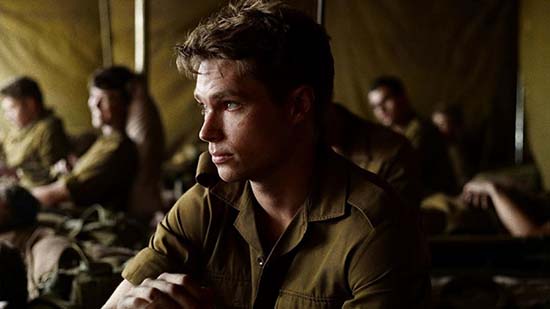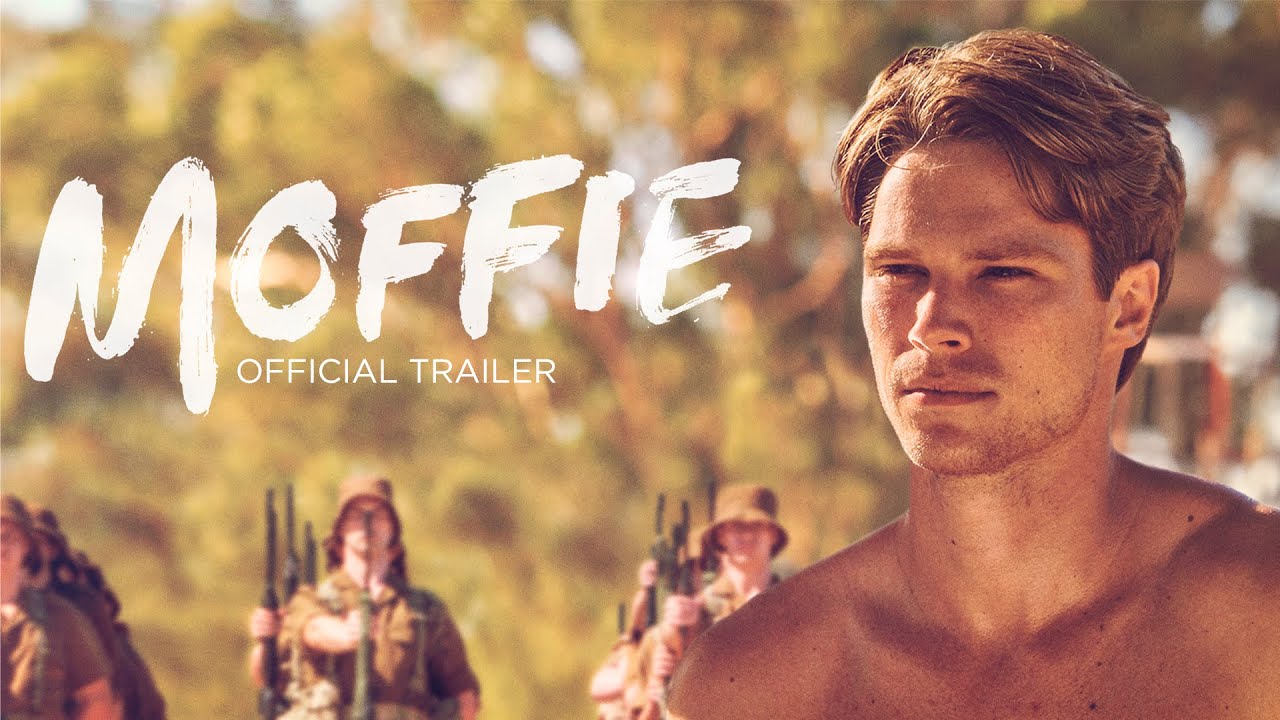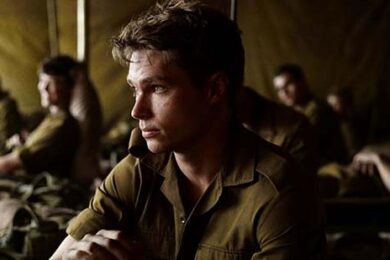Through the pixelated image, Oliver Hermanus wears a relaxed smile. His voice is slightly delayed, but we quickly get the hang of what is now very much the norm in a Covid climate. He is sitting at home in the small village of Barrydale, about 130 miles from Cape Town, a place where lockdown hasn’t much changed his daily life. It has severely impacted the cinematic release of his new film Moffie though, which opened in South African cinemas on 13 March to critical acclaim, two weeks before the country’s lockdown began. Hermanus and producer Eric Abraham (who also produced the Oscar-winning Ida) have been working hard to make the film accessible on streaming services in South Africa, and instead of delaying the release in the UK, it will now be made available exclusively on Curzon Home Cinema. The 37-year-old director now has four feature films under his belt since his debut in 2009, all of which have premiered at some of the most prestigious festivals in the world, from Cannes and Locarno to Venice, with his last film Skoonheid (Beauty) selected as South Africa’s entry to the 2012 Oscars.
Moffie is a controversial name for a film. Whilst it doesn’t have the same immediate provocation for non-Afrikaans speakers, it screams a homophobic slur and is used in South Africa as a weapon of shame. The film is adapted from Andre-Carl van der Merwe’s memoir of the same name, a book which focuses on the experience of gay white soldiers during the South African Border War (Angola Bush War), a time when white men were conscripted to fight for the apartheid state during the late ’60s, ’70s and ’80s. It’s a book that’s “only really known amongst gay white men who went to the army”, Hermanus tells me. “I don’t think it’s had an appeal to the majority of black South Africa.”
As a person of colour, Hermanus had a stumbling block with the prospect of writing and directing a story centred on white South Africa. “When I was offered the book and I realised the producers were asking me to make a film about the trauma of white men during apartheid, that was the road block for me,” says Hermanus. “I am a coloured South African, a mixed race South African, so my personal family history is not connected to this war, in the sense that only white men had to go to the army, so my father didn’t go.” To find a motivation to tell this story, Hermanus needed to explore the “racial dynamic” of the war. He explains that the memoir “doesn’t seem to have any context of what the behaviour of this white society was like towards black people.” It is this contextualising of race relations which makes Hermanus such a skillful director. The filmmaker explores white male trauma whilst never neglecting the violence and dehumanisation of the apartheid. Instead of sticking to the hermetic atmosphere of the book, Hermanus shoots haunting scenes of black trauma that stick with you. An older black man sitting at a station when the train of conscripts is passing through; the young soldiers shouting racial slurs whilst the mute man looks on in shock. A black family at one of the compounds stands with their baby crying, whilst soldiers discuss how they will “have their fun with them after”, and in the first death from the conflict, a black boy lies sputtering and choking from a gunshot before he dies. Hermanus is not only looking at the absurd pressures of white masculinity in the South African Defence Force, but its impact on black people.
“I think the intentional thing was to put the global audience, and specifically South Africans, in the headspace of white South Africa, so you’re seeing the black people from that perspective, and from an undeniably aggressive point of view,” Hermanus explains. “All the black people in this film are the objects and subjects of violence and shame and harm. There was an element of the programming of these men that was about dehumanising black people.” So whilst the story focuses on Nicholas Van der Swart (extraordinarily played by Kai Luke Brummer), a young white gay soldier, Hermanus is looking at how the uber-masculine environment in the army bred toxicity towards black people, and boldly links this to the dehumanising treatment of gay white men at the time. “I realised that if you were gay and you were white in South Africa in the ’80s, as much as if you were black, you were also called an enemy of the state, because your sexuality was a crime, and so therefore you were a crime.” Hermanus tells me how this is a subject which is rarely discussed in terms of apartheid, and how gay people and people of colour were left with a similar dilemma.
“For the LGBTQI+ community at the time, there was a choice you had to make, you could choose to love your authentic self at the risk of being incarcerated, or you would have to bury that part of yourself. So that is really part of the ethos that many South Africans had to fight against in apartheid, it was always the choice of whether you were going to allow the system to dominate or if you were going to be an activist.”
Hermanus’ lead character Nicholas carries his sense of shame in his shyness, in the way he keeps his head down and tries to blend in as much as possible, despite falling for another soldier, Dylan Stassen (Ryan de Villiers). But Hermanus allows subtle queer spaces to exist in the macho environment, without ever feeding into a “fantasy of gay men in the army.” Hermanus adds, “What I did want to do was to sometimes step inside of Nicholas’s head where there was a purity to his sexual coming-of-age, there was an admiration for the feelings that he was experiencing, especially as he is sexually awoken. I wanted that to still be beautiful and positive in the context of the rest of the film.” Hermanus achieves just that, finding tender and uplifting moments of queerness within an environment which was doing everything it could to suppress it. So where does this leave Nicholas in terms of being an activist, or allowing the system to dominate him? “The boldest thing he ever does is ultimately going and seeking out Dylan at the end in this very, very subtle way, going to try and touch his hand, with Nicholas choosing to pursue Dylan but ultimately getting rejected,” Hermanus says. “But the hope is that he has made a choice to love and be the person that he is, whether that is going to be overtly or at least just privately, and knowing that that choice comes through having experienced so much brutality and so much oppression and dehumanisation.”
This leads us to the subject of the real-life Ward 22, the infamous psychiatric hospital ran by Dr Aubrey Levin, where gay soldiers were sent to be ‘cured’ of homosexuality and suffered monstrous human rights abuses. How famous is Ward 22 in South Africa, I ask Hermanus? “There was a documentary in South Africa that was made a couple of years ago,” he says. “The big story with Ward 22 is this doctor who was running it in the late ’70s who went on the run to Canada at the end of apartheid, and it was only recently that he was finally incarcerated for what he did. This documentary that was made chronicled the people who were worst effected, men that had forced sex changes.” A few weeks ago, whilst Hermanus was doing radio interviews for Moffie, the subject turned to Ward 22. “Somebody from the public called in; a woman told the story of how she used to be a man and how she was a victim of Ward 22, and how she had had forced gender reassignment surgery during her time in the army,” Hermanus explains. “It’s fucking Frankenstein kind of stuff, another extremity of the apartheid system. And whilst we could have made an entire film about Ward 22, it was always hard for us to decide how to incorporate it but not to get lost inside of it.” Instead, Moffie hints at the Ward like that of a bad dream, always coming at it from Nicholas’ perspective, hearing about it from others. It’s just enough for audiences to understand about what happened, without taking flight from the core perspective, from Nicholas. He is a primary witness to how the army was a breeding ground for apartheid-era white supremacy, homophobia and toxic masculinity, but he is also testament to the honesty and authenticity we can all embrace.
Moffie is a vital piece of filmmaking which will help pave the way for more South African films centred on queerness, and help to change perceptions and social expectations of what it means to be a man today.
Moffie is available on Curzon Home Cinema from 24th April




